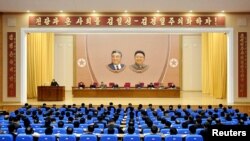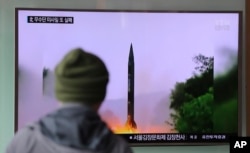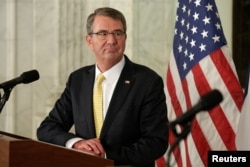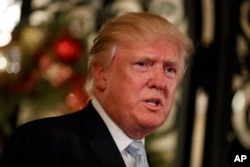South Korean officials say they believe Pyongyang's latest threat to test an intercontinental missile is intended to set the stage for future relations with the incoming U.S. administration of President-elect Donald Trump.
“By maintaining its position to continue firing (missiles) and provocations, (North Korea) intends to bring a change of attitude in the U.S.," said South Korean Unification Ministry spokesman Jeong Joon-hee, speaking a day after North Korea declared it could test-launch an intercontinental ballistic missile at any time from any location.
The claim was reported Sunday by North Korea's official KCNA news agency, quoting an unnamed Foreign Ministry spokesman.
Jeong suggested that Pyongyang issued the threat in hopes of forcing the Trump administration to engage North Korea on its own terms. He said the goal was to "shift responsibility (to the U.S.) when North Korea fires (a missile) in future.”
North Korea first threatened last week to test an intercontinental ballistic missile that could strike the United States, prompting Trump to tweet, "It will not happen." The incoming president left open what he might do to stop it, prompting speculation about a possible U.S. military strike against a North Korean launch site.
Chung Sung-yoon, a research fellow at the Korea Institute for National Unification in Seoul, said an early test of the Trump team's resolve could backfire on North Korea. If Korea fires an ICBM before the Trump administration has developed a security strategy for Northeast Asia, it could lead to a much tougher U.S. policy, he said.
The South Korean Defense Ministry called the North’s talk of an ICBM test “regrettable” and said there would be consequences in terms of international sanctions. “If North Korea ignores our warning and launches an ICBM, it will face more strong and thorough sanctions and pressure from South Korea as well as from the international community,” said spokesman Moon Sang-kyun.
In Washington, U.S. Secretary of Defense Ash Carter said Sunday that the United States would be willing and able to shoot down the missile if it crossed over the territory of the U.S. or its allies.
"If it were coming-if it were threatening to us, yes. That is, if it's predicted impact or one of our friends or allies, yes, we would shoot it down," Carter said on the NBC television program Meet The Press.
Development
A long range ICBM test would not be an unprecedented technological feat for North Korea. It has already conducted four satellite launches using its Taepodong-2 missiles as rockets. The North’s space program has been widely denounced as a hostile pretense to advance its nuclear and ballistic missile technologies that are banned by United Nations resolutions.
North Korean leader Kim Jong Un has made clear in the last year his government’s ambition to achieve a credible nuclear deterrence. Increasing international sanctions imposed have failed to deter the North from intensifying its development efforts with two nuclear tests and 24 missile launches in the last year. Last week, U.S. Deputy Secretary Of State Antony Blinken said of the North’s nuclear program that “with every passing day, the threat does get more acute.”
North Korea is believed to have the ability to strike nearby South Korea and Japan with a nuclear weapon. But there remain questions over the North’s ability to reach the U.S. mainland.
Although Pyongyang claims it has successfully miniaturized a nuclear device to fit on the head of a long-range missile, it has not demonstrated that capability. Nor has it yet tested the missile's re-entry capability needed to reach a specific target while withstanding extremes of temperature and vibration. An ICBM test would be the next step in the development process.
China
Neither Beijing nor Tokyo offered any strong official reaction on Monday to the ICBM warnings coming out of Pyongyang and Washington.
Last week Trump criticized China in a tweet for not doing more to rein in the North Korea nuclear threat. Although North Korea is dependent on China for 90 percent of its trade, Beijing has been reluctant to apply strong economic pressure on its ally for fear it would lead to increased instability on its border and a stronger U.S. presence on the Korean Peninsula.
China’s Foreign Ministry spokesman Geng Shuang last week defended his country’s efforts to peacefully resolve the nuclear issue and urged the incoming Trump administration to “avoid remarks and actions to escalate the situation.”
Japan
Tokyo this week seems more focused on a flare-up in tensions with Seoul over a "comfort woman" statue that was placed in front of the Japanese consulate in the South Korean city of Busan.
On Monday, the Japanese ambassador and consul general to South Korea were called home in protest.
The two countries reached a bilateral agreement in December of 2015 to resolve the contentious issue over the Korean women, who were forced to work as prostitutes in Japanese military brothels during World War II.
In the settlement, Prime Minister Shinzo Abe issued an agreed-upon apology and Japan donated $8 million to support the surviving comfort women. South Korea also agreed to try to facilitate Japan’s request to remove a “comfort woman” statue erected across from the Japanese Embassy in Seoul.
Seoul contends the statues fall outside the agreement as they belong to private organizations and not to the state, but Tokyo sees them as violations of the spirit of the agreement.
Youmi Kim and Han Sang-mi in Seoul contributed to this report.








